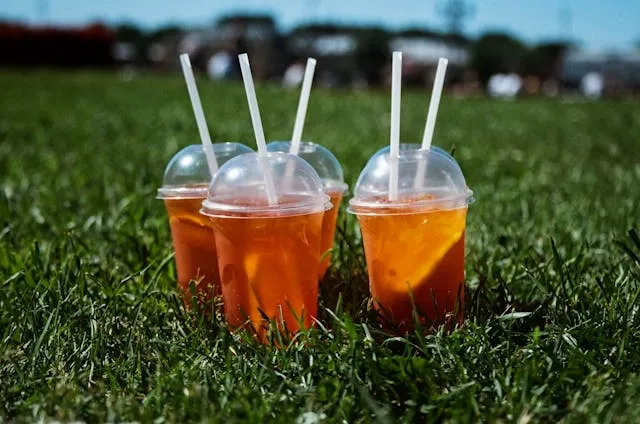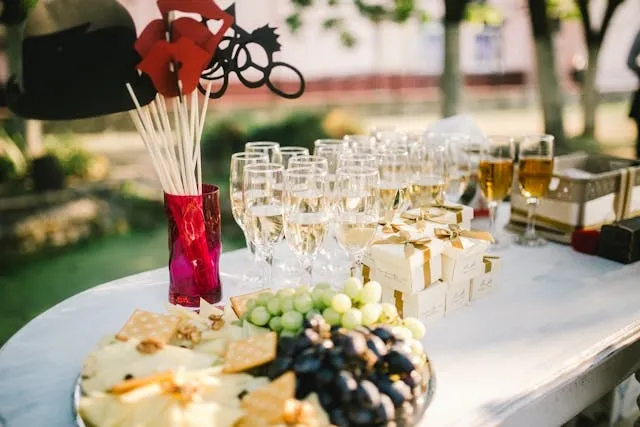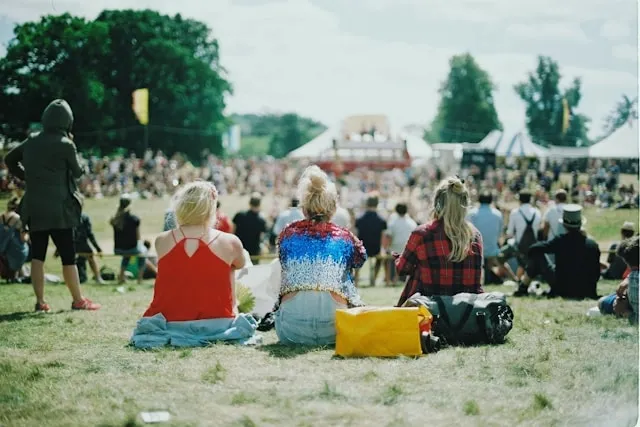Outdoor Event Planning: Weather Safety & Guest Comfort Tips
Outdoor event planning takes careful consideration of things like the weather and guest comfort. In this guide, we provide essential tips for designing a safe and enjoyable experience, no matter what’s forecast. From choosing the right venue and preparing for unexpected weather to providing comfortable seating and shelter, our tips help you navigate the potential challenges. Deliver a smooth event and keep your guests happy with our guidance.

Key Takeaways
- Define your event’s objectives, choose a suitable venue, secure the necessary permits, and prepare for weather whilst providing guest comfort with diverse amenities.
- Keep an eye on weather forecasts and develop backup plans like tents or indoor alternatives. Logistics should be efficiently managed throughout.
- Use multiple channels to promote your event in the build-up. Craft engaging invitations and keep your guests informed to boost attendance and engagement.
- We supply high-quality custom table covers for a range of applications. Our products will offer practical and aesthetic benefits to any outdoor event, with superb durability guaranteed.
Table of contents
-
Outdoor Event Planning Guide
-
What Are The Dos And Don’ts Of Planning A Large Outdoor Event?
-
What Equipment And Gear Are Essential For Outdoor Events?
-
How Do You Select The Perfect Outdoor Venue?
-
What Are The Necessary Permits And Regulations For Outdoor Events?
-
How Do You Ensure Guest Comfort And Amenities At An Outdoor Event?
-
How Do You Manage Logistics, Setup, And Cleanup For An Outdoor Event?
-
How Do You Prepare For Weather And Contingency Planning For Outdoor Events?
-
What Safety And Health Precautions Are Necessary For Planning Outdoor Event?
-
How Do You Effectively Promote Your Outdoor Event And Send Out Invitations?
Outdoor Event Planning Guide
Planning an outdoor event revolves around several key steps for success:
- Define the event’s objectives and estimate your budget.
- Find the perfect venue. It should accommodate your anticipated guest numbers, provide essential amenities, and suit the event theme.
- Obtain the necessary permits or permissions for outdoor spaces.
- Prepare for unpredictable weather conditions by including contingency plans like tents or backup venues.
- Think about providing shaded areas, seating, and access to restrooms.
We recommend that you research local weather patterns to determine some ideal event dates. You should also create a detailed logistics plan for setup and teardown and keep your guests updated on weather developments. Also, prepare for details on the day, like designing custom printed tablecloths to create the right ambiance, and ensure your on-site staff are fully briefed on the event schedule.

Why Is Creating A Timeline Important For Planning An Outdoor Event?
It is crucial to create a timeline for planning an outdoor event as this is a great way to ensure everything is organized and executed on schedule. With a well-structured timeline, you can:
- Prioritize tasks
- Allocate resources
- Prevent last-minute challenges
For outdoor events, a timeline is particularly important as weather unpredictability and logistical complexities are common. It allows for proper coordination of tasks like securing permits, booking vendors, and setting up equipment. Additionally, it accounts for contingency planning, ensuring you make alternative arrangements in case of weather disruptions.
With a clear timeline, you also facilitate smooth communication between your event team, vendors, and guests. Sticking to a detailed timeline helps event planners avoid unnecessary stress, meet deadlines, and deliver a seamless, enjoyable experience for all in attendance. Remember, 87% of event marketers see participant satisfaction as a potential factor for success.
What Are The Dos And Don’ts Of Planning A Large Outdoor Event?
When planning a large outdoor event, there are several things you should and should not do.
Best practices:
- Secure permits early: Ensure you get all the necessary legal and venue permits well in advance.
- Prioritize guest comfort: Your guests will want seating, shade, and hydration stations for comfort.
- Have a contingency plan: Prepare for weather changes by arranging backup tents or indoor venues.
- Book reliable vendors: Vendors with experience of outdoor settings make for smoother logistics.
Common mistakes:
- Overlooking weather forecasts: Ignoring potential weather conditions is a big mistake.
- Forgetting crowd control: You must provide sufficient security, signage, and access to exit points.
- Skipping AV checks: Test sound and lighting equipment upfront to avoid technical issues.
- Rushing the decor: Explore the best tablecloths for events and other decor details to create the right ambiance for a memorable experience.
Essential Tips For Ensuring A Successful Outdoor Event
Planning a successful outdoor event requires meticulous attention to detail. Here are some tips:
- Venue: Select one that is a good fit for your event’s size and theme.
- Weather: This is always a factor. Prepare for the worst with tents or a backup indoor location in case of extreme weather.
- Guest experience: This is key - offer shaded seating, hydration points, and restrooms for comfort, and ensure an intuitive layout.
- Personalization: Guests will enjoy unique touches in the decor. Things like custom pulpboard coasters are easy to create and make your event more memorable.
- Testing: Things like sound, lighting, and technical equipment should be tested well in advance to avoid issues.
- Contingency plans: Keep a close eye on weather forecasts and have backup plans in place to ensure your event runs smoothly.

Make a statement with out custom table covers!
Are you ready to stand out at your next event?
Order now and elevate your brand with our high-quality, personalized table covers.
What Equipment And Gear Are Essential For Outdoor Events?
Proper equipment and gear are crucial to the success of your outdoor event. Here are some essential considerations:
- Lighting and sound: Ensure you have adequate lighting for evening events and professional sound systems to deliver clear audio, particularly in open spaces.
- Power needs: You will likely need generators, extension cords, and power strips to keep everything running smoothly, from lights to microphones.
- Essential gear: For guest comfort, you should provide tents for shade or rain shelter. They will also need ample seating, outdoor heating/cooling, and sturdy, weather-resistant tables with weather-resistant table covers.
Our high-quality custom waterproof tablecloths are ideal for outdoor events. They provide a professional, personalized look whilst helping protect tables and other surfaces from the elements. Work with us to keep your event looking polished even if the weather is unpredictable.
How Do You Select The Perfect Outdoor Venue?
Selecting the perfect venue is a key consideration when planning an outdoor event. There are several factors involved in getting this right:
- Location and accessibility: The venue should be convenient for your target audience. You need ample parking and clear signage, and the venue should be appropriate for the size and style of your event, whether casual or formal.
- Seasonal considerations: Be mindful that there may be rain in spring, while summer might necessitate shade and hydration stations. Your chosen venue should have provisions for different weather conditions, and take steps yourself like using tablecloth clips on tables.
- Rules and regulations: Some venues have certain restrictions on noise, alcohol consumption, or setup timing. You may also need permits for amplified sound or large gatherings.
Understanding and planning for these key considerations will help you find the perfect venue and make it work for your needs.
Promote your brand with our custom table covers!
Ready to make a lasting impression at your next event?
Order now and showcase your brand with our eye-catching, personalized table covers.
Make Your Custom Table CoversWhat Are The Necessary Permits And Regulations For Outdoor Events?
During outdoor event planning, you need to secure the necessary permits. This might include permits for noise levels, selling alcohol, fire safety, street closures, and more. You will typically need to contact your local government, identify the permits you need, and submit applications well in advance.
Regulatory compliance is another key consideration. Educate yourself on local ordinances and health and safety regulations to ensure you don’t get penalized. This includes understanding rules around things like:
- Waste disposal
- Noise restrictions
- Public safety guidelines
Certain venues have specific rules around setup, cleanup, capacity limits, and permitted noise. Communicate with the venue’s management to ensure you meet their protocols.
Additionally, consider your event’s environmental impact. Make sustainable choices where possible like minimizing energy use and reducing waste to comply with best practices for eco-friendly events.
How Do You Ensure Guest Comfort And Amenities At An Outdoor Event?
Guest comfort is another key consideration when planning an outdoor event. This starts with ample seating and shelter options, so look at things like tents, umbrellas, and shaded areas to protect attendees from harsh weather conditions. And put a lot of thought into providing comfortable seating arrangements, using placemats with tablecloths to create comfortable table settings.
Hydration stations should be positioned around the venue to keep guests refreshed - you may need multiple water stations for larger events. There should also be adequate sanitation facilities, meaning restrooms, portable toilets, and handwashing stations.
To accommodate all your attendees, including those with disabilities, prioritize accessibility. Design paths that are easy to navigate and provide wheelchair ramps where they are needed. Restroom and seating provisions should be accessible for everyone.
By putting guest comfort first and providing accessible facilities for all, you create a welcoming and enjoyable environment for everyone at your event.
Attract attention and make a statement at your next event with our high-quality, personalized table covers.
Showcase your brand with our custom table covers!
Order now and promote your brand in style.
How Do You Manage Logistics, Setup, And Cleanup For An Outdoor Event?
Planning the logistics for an outdoor event involves organizing transportation, coordinating equipment setup, and delegating roles to staff. Ensure your draw up a clear schedule and designate roles for the setup, execution, and teardown of your event.
Make setup and cleanup efficient by starting early and creating checklists to ensure everything is in place before guests arrive. Create custom outdoor table covers that are easy to use, make sure tents or gazebos are easy to set up, and have a team on hand to make last-minute adjustments if necessary. After the event, organize a systematic cleanup process.
Vendor coordination is also crucial. Communicate early with vendors to confirm delivery and services are running to schedule. Have backup plans for vendor delays to avoid disruptions. Regular updates and checks with vendors will help ensure all aspects of your event run smoothly.
How Do You Prepare For Weather And Contingency Planning For Outdoor Events?
Weather monitoring is absolutely essential for outdoor events. You should check forecasts regularly and be prepared for sudden changes. By doing this, you can anticipate weather conditions and make changes if necessary.
It’s important to have backup plans in place for adverse weather. These can include:
- Setting up temporary shelters
- Arranging an indoor alternative
Relay these plans to your team and vendors so everyone is on the same page.
Put wind and rain protection in place to safeguard guests and equipment. Tents should have proper anchoring and sidewalls to shield against wind and rain. And there are various solutions, like tablecloth clips and weights, to keep table covers from blowing away in the wind. Put these measures in place to help maintain the event’s success.
Make a lasting impression with our high-quality, eye-catching designs
Enhance your brand's presence at your next event with our stunning, personalized table covers
Order now and elevate your brand in style.
Make Your Custom Table CoversWhat Safety And Health Precautions Are Necessary For Planning Outdoor Event?
Safety measures are compulsory for outdoor events. Implement crowd control strategies like:
- Clear signage
- Robust barriers
- Trained staff
These things can help manage large groups and ensure orderly movement. There should also be emergency plans in place, like evacuation plans and designated emergency exits.
Health considerations are another vital factor. You should have first aid stations with qualified personnel, and they should be well-equipped on the day. Pest control should be tended to so that insects and other wildlife are not a problem. And sanitation should be a top priority, with restrooms and handwashing stations available to maintain hygiene.
Safety and health precautions are fundamental to creating a secure and comfortable environment for all in attendance. Be mindful of them to minimize risks and enhance the overall event experience.
Tips To Manage Potential Risks At An Outdoor Event
To manage potential risks when planning an outdoor event, you should be proactive in your preparations.
- Conduct a risk assessment: This helps identify potential hazards like uneven ground, severe weather, or high attendance. Evaluate these risks and develop mitigation plans.
- Implement safety measures: Barriers, clear signage, and accessible emergency exits are all helpful, alongside adequate staff training.
- Prepare for weather: Weather forecasts should be closely monitored, and you should put contingency plans in place. Weather-resistant equipment like tents and canopies will help.
- Medical readiness: Set up first aid stations with trained personnel and the necessary supplies. Ensure swift access to medical assistance if needed.
- Communicate early: Your attendees should be kept informed about safety protocols and emergency action plans so that they are prepared.
Address these areas carefully to reduce risks and ensure everyone can enjoy a safe environment.

How Do You Effectively Promote Your Outdoor Event And Send Out Invitations?
Effective promotion of your outdoor event takes a multi-channel strategy:
- Promotion: Take advantage of social media platforms to share engaging content, create event pages, and run targeted ads. Email marketing is a proven method of reach your existing audience with updates, and you could consider local media and community boards for additional visibility.
- Invitations: Craft visually-appealing invitations that include key details like date, time, location, and RSVP instructions. Further personalize invitations by putting them in custom envelopes to make guests feel valued, and use digital platforms for streamlined RSVP management.
- Engagement: Build excitement with interactive content like social media polls, teasers, and exclusive previews. Communicate consistently and engage people to maintain interest and help boost attendance.
By combining these strategies, you can make your event more visible and ensure a strong turnout when the big day arrives.
Frequently Asked Questions About Outdoor Event Planning
What Are The Important Parts Of Outdoor Event Planning?
The key elements of outdoor event planning are to define the event’s objectives, finding the right venue, getting the necessary permits, and planning for potential weather conditions on the day.
What Equipment And Gear Are Essential For Outdoor Events?
You will need to have sanitation stations, toilet facilities, adequate seating, shelter and shading from weather. It’s also important to have a first aid station and to provide barriers and signage for crowd control around the venue.